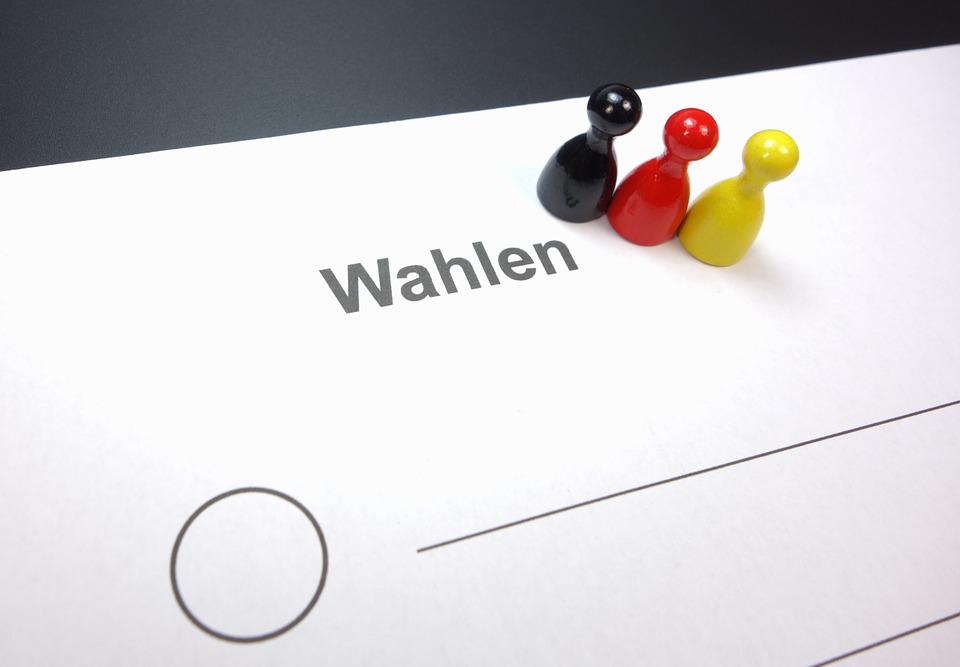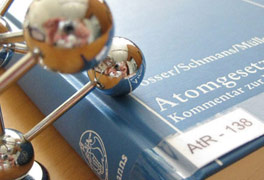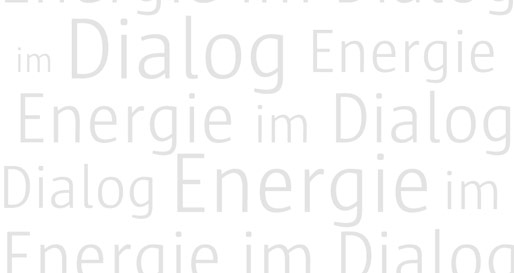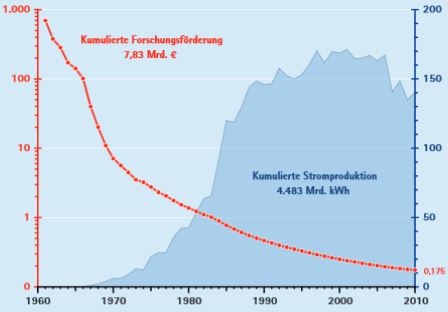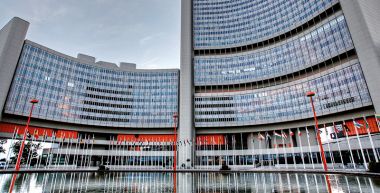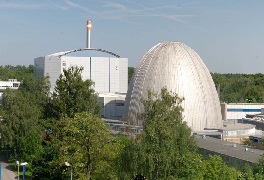Politics & Society
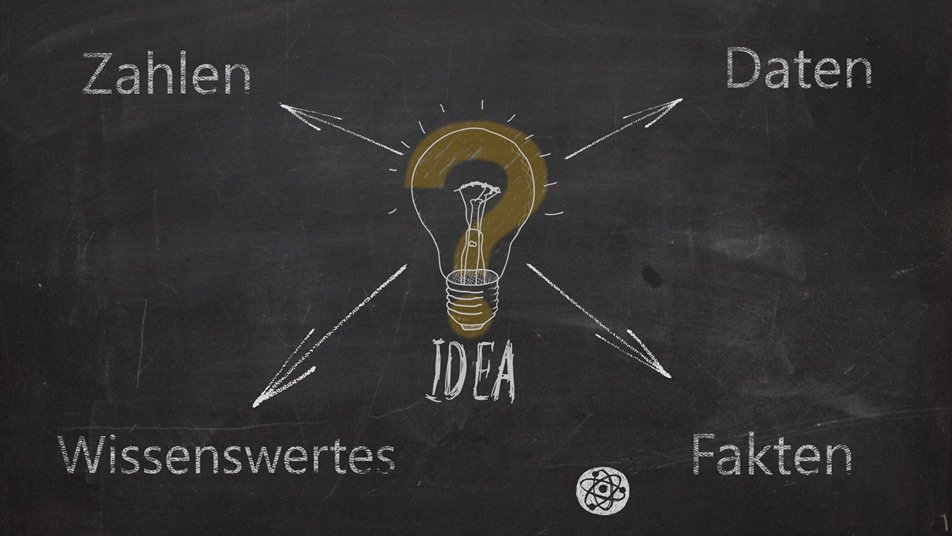
Allensbach survey on energy policy priorities and challenges in 2019
Allensbach survey on nuclear energy 2018
Allensbach survey on nuclear energy in the run-up to the 2017 federal election
Allensbach survey on the climate of opinion on nuclear energy 2017
forsa survey: the main thing is security of supply
forsa survey: Opinions on nuclear energy
forsa survey on the repository commission
forsa survey on the EU Energy Directive
forsa survey special on final disposal
forsa survey on the decommissioning and dismantling of nuclear power plants
Facts about nuclear energy
Statement: "Nuclear power causes significantly less CO2 emissions than coal-fired power plants, but more than renewable energies."
Fact check: Over the entire life cycle, the following CO2 equivalent emissions are produced per kWh generated by the various energy sources: photovoltaics: 78-217 g, wind 10-38 g, water 4-36 g, nuclear energy 5-33 g (see: PSI 2004/2007, ILK 2004, IER 1997/2000, EU 2007, Öko-Institut 2006). In its latest special report on the global 1.5-degree target, the International Panel for Climate Change assigns nuclear energy an important role in climate protection.
Statement: "Those who rely on nuclear power are first and foremost blocking the necessary transition to a secure and sustainable energy supply."
Fact check: The decision to phase out nuclear energy has been made politically in Germany. This decision was and is accepted. Regardless of this, nuclear energy and renewables are not contradictory. On the contrary: renewables enjoy legal "right of way" when it comes to feeding electricity into the grid. In addition, nuclear energy with base load capability will secure the times when the sun is not shining and the wind is not blowing until 2022. Base load-capable nuclear energy is primarily replaced by electricity generation from fossil fuels, both at home and abroad. Worldwide, practically all countries with nuclear energy in their energy mix are also focussing on renewables.
Statement: "Germany is currently producing an abundance of electricity."
Fact check: In terms of security of supply, resource and climate protection and costs, it is crucial that electricity is generated in line with demand and at the right time. If this is not the case, this generally leads to a negative import/export balance from an economic perspective. Surplus electricity is exported at low prices in times of low demand. Electricity that meets demand because its generation can be planned or reserve capacity is imported at high prices.
Statement: "There is currently no process worldwide for the complete recycling of radioactive waste."
Fact check: German legislation provides for the final disposal of radioactive waste in deep geological formations. Accordingly, the final repository for high-level radioactive waste is expected to be completed around the middle of this century. The final disposal of highly radioactive waste has been technically solved. The construction of such a repository in Finland, for example, under less favourable geological conditions than in Germany, also shows that the politicians legally responsible for final disposal have a decisive role to play in its timely realisation.
In the current edition of the annual report Reference Data Series No. 1 the IAEA presents forecasts of nuclear generation capacity for various regions. This analysis includes various international studies, including the World Energy Outlook 2017 of the IEA. The forecasts are presented in Low and High scenarios, depending on current uncertainties in the planning of new plants and the decommissioning of existing power plants.
Generation capacity worldwide
In the High scenario, the global generation capacity of nuclear energy shows a continuous increase to 748 GWe by 2050, which corresponds to an increase of 90% compared to 2017.
In contrast, the Low scenario, capacity will initially decrease until 2040 and then increase again to a higher level in the following ten years.
Generation capacity in the Northern, Western and Southern Europe region
Due to the long-term phase-out of nuclear energy and the reorganisation of energy systems in various countries, a contradictory trend is emerging in Europe.
Both scenarios illustrate a steady decrease in capacity until 2050. Compared to 2017, this means a decrease of 62% (Low) resp.
19% (High).
Start-up financing or subsidy?
From atw 01 2016
In the discussion about the use and benefits of nuclear power plants, it is repeatedly claimed that nuclear energy has received public subsidies, some of them extensive, to this day. This is the only reason why electricity from nuclear power plants is economical at all. This statement is still incorrect. Public expenditure for the entire R&D area of nuclear energy is summarised. In relation to the amount of electricity generated from nuclear energy to date, the specific research expenditure for this sector amounts to around €0.16 cent/kWh.

Energy in dialogue
The availability of the Konrad repository is a key factor for the swift and efficient dismantling of Germany's nuclear power plants. The timely provision of the repository is also necessary in view of the residual materials from medicine, research and industry.
The Federal Company for Final Disposal (BGE) has set a binding deadline of the first half of 2027 for the completion of the Konrad repository. The timely realisation is also the litmus test of whether we in Germany can implement the technically resolved final storage issue socially, politically and technically.
Against this backdrop, we discussed the detailed roadmap up to 2027 and the associated effects, opportunities and risks with invited guests and experts from business and politics.
Moderation: Dr Ralf Güldner | President DAtF
- Judith Skudelny MdB, environmental policy spokeswoman for the FDP parliamentary group in the Bundestag
- Stefan Studt, Chairman of the Management Board, Bundesgesellschaft für Endlagerung mbH (BGE)
- Pieter Wasmuth, Chief Representative of Vattenfall GmbH for Hamburg and Northern Germany
After the phase-out of nuclear energy at the end of 2022, Germany will no longer have any experience in operating nuclear power plants. Above all, this will jeopardise Germany's ability to have a say in the assessment of foreign nuclear facilities. In order to prevent this, the governing parties have agreed to develop "a concept for the prospective retention of expertise and personnel for the operation, dismantling and safety issues of nuclear facilities as well as for interim and final storage" by the end of the legislative period.
With invited guests and experts from industry and politics, we examined the question of what a competence concept for nuclear safety assessment could look like that would allow our country to continue to assess nuclear power plant technology and its development abroad after the phase-out.
Moderation: Dr Ralf Güldner | President DAtF
- Karsten Möring MdB | Rapporteur on nuclear energy for the CDU/CSU parliamentary group, German Bundestag
- Dr Frank Sommer | Head of CoC Operations/Senior Vice President, PreussenElektra GmbH
- Uwe Stoll | Technical and Scientific Managing Director, Gesellschaft für Anlagen- und Reaktorsicherheit gGmbH
- Ernst Michael Züfle | Managing Director, Kraftwerksschule e.V.
The UK will continue to rely on nuclear energy in its energy mix in the future. In addition, many nuclear facilities will have to be dismantled in the coming decades. This makes the UK one of the most important markets for nuclear technology in Europe - including for German companies and organisations.
What impact can or will Brexit have on German-British cooperation in the field of nuclear technology? What challenges exist, what needs to be considered and what opportunities are there?
We discussed these and other questions with our guests at the DAtF panel on the evening of 18 April 2018 in Berlin.
Moderation: Dr Ralf Güldner | President DAtF
- Axel Göhner | Government Director, Federal Ministry for Economic Affairs and Energy, Berlin
- Nick Leake | Counsellor and Head of the EU and Economic Section, British Embassy, Berlin
- Herbert Lenz | Managing Director, Westinghouse Electric Germany GmbH, Mannheim
- Dr Christian Raetzke | Lawyer, CONLAR Consulting on Nuclear Law, Licensing and Regulation, Leipzig

Germany has excellent experience in dismantling a wide range of nuclear facilities. However, it is also worth looking abroad: Dismantling is also underway in some countries. Against the background of preserving our knowledge and business location, it makes sense to seek professional dialogue. On the other hand, the international dismantling market already represents a significant business area for companies in Germany and offers a wide range of opportunities in the future. These activities also contribute to the application and development of expertise.
The DAtF discussed this on the evening of 15 November 2017 in Berlin:
Moderation: Dr Ralf Güldner | President DAtF
- Dr Astrid Petersen | Managing Director, TÜV NORD EnSys GmbH & Co. KG
- Guillaume Dureau | Senior Executive Vice President for Customer Care, Strategy, Innovation and R&D, New AREVA
- Johan Svenningsson | Country Chairman, Uniper Sweden
- Alf Henryk Wulf | Chairman of the Executive Board, GE Power AG
as panellists.
In the long term, academically and technically qualified specialists will be needed to ensure the safe residual operation of nuclear power plants, dismantling and disposal, Germany's future involvement in international safety standards and the preservation of the nuclear industry and research centre. Operators, industry and research as well as experts and authorities face this challenge together.
The DAtF took up this topic as part of its "Energy in Dialogue" series of events and organised an open and objective exchange in the form of a panel discussion with decision-makers and experts from politics, business, industry and science, with Dr Ralf Güldner, President of the DAtF, as moderator and with
- Andrea Martin | Consultant, Department of Reactor Safety and Radiation Protection, Ministry for Energy Transition, Agriculture, Environment and Rural Areas of the State of Schleswig-Holstein
- Prof Dr Winfried Petry | Scientific Director FRM II, Technical University of Munich, and Director at the Heinz Maier Leibnitz Centre (MLZ)
- Eberhard Schomburg | Member of the Management Board, Human Resources and Social Affairs, PreussenElektra GmbH
- Uwe Stoll | Technical and Scientific Managing Director, Gesellschaft für Anlagen- und Reaktorsicherheit (GRS) gGmbH
as panellists.

Since the accelerated phase-out of nuclear energy in Germany, the dismantling of nuclear power plants has become the focus of attention for the nuclear industry, politicians and the public. In addition to the challenges posed by the authorisation process and social acceptance, there are also opportunities and future market potential. This applies not least with regard to international projects, both for the operators of nuclear power plants and for a large number of other companies in Germany.
In cooperation with the BDI, the DAtF took up this topic as part of its "Energy in Dialogue" series of events and organised an open and objective exchange in the form of a panel discussion with decision-makers and experts from politics, business, industry and science with Dr Ralf Güldner, President of the DAtF, as moderator and
- Holger Lösch | Member of the BDI Executive Board
- Frank Apel | Senior Vice President Back End Germany, AREVA GmbH
- Prof. Dr.-Ing. Sascha Gentes | Head of Institute for Technology and Management in Construction Operations, Competence Centre for Deconstruction, Karlsruhe Institute of Technology
- RDir Dr Edgar Mergel | Head of Division Decommissioning, Post-operation and Research Reactors, Federal Supervision of Nuclear Power Plants, Federal Ministry for the Environment, Nature Conservation, Building and Nuclear Safety
- Jörg Michels | Chairman of the Management Board, EnBW Kernkraft GmbH
as panellists.

The Commission on the Storage of High-Level Radioactive Waste will submit its final report to the Bundestag, Bundesrat and Federal Government in mid-2016. Among other things, the report will set out scientific, technical and social recommendations for the search for a repository for high-level radioactive waste in Germany. The remaining time will be used to intensively discuss the draft report, particularly with the public. The DAtF discussed the results, milestones and open questions as part of its "Energy in dialogue" series of events. Dr Ralf Güldner, President of the DAtF, discussed this with
- Prof Dr Gerd Jäger | RWE AG, Member of the Commission on Final Storage
- Sylvia Kotting-Uhl MdB | Spokesperson for nuclear policy, Alliance 90/The Greens parliamentary group in the Bundestag, member of the Commission on Final Storage
- Dr Peter Matuschek | forsa Politik- und Sozialforschung GmbH, Berlin office
With its "Energy in Dialogue" series of events, the DAtF offers decision-makers and experts from politics, business, industry and science a forum for an open and objective exchange of views on current topics relating to nuclear energy and nuclear technology.

Europe favours secure, competitive and low-CO2 energy generation. Determining the energy mix in the individual countries is a national task.
On 2 December 2015, Dr Ralf Güldner, President of the DAtF, discussed with experts from the UK, France, Switzerland and Belgium which strategy various European countries are pursuing on the way to a climate-friendly energy supply and what role nuclear energy plays in this:
- Bert Wollants | Member of the Belgian Chamber of Deputies
- Susie Townend | First Secretary Environment & Energy, British Embassy Berlin
- Dr Jean-Claude Perraudin | Counsellor for Atomic Energy and Alternative Energies, French Embassy Berlin
- Beat Bechtold | Managing Director, Nuklearforum Schweiz
With its "Energy in Dialogue" series of events, the DAtF offers decision-makers and experts from politics, business, industry and science a forum for an open and objective exchange of views on current topics relating to nuclear energy and nuclear technology.

Since summer 2014, the Commission on the Storage of High-Level Radioactive Waste has been developing proposals for the decision-making basis in the subsequent site selection process. After a good nine months, an initial assessment should be made: What priorities does the Commission see for its work? What progress has already been made and what milestones are still to be achieved in 2015?
On the evening of 3 February 2015, Dr Ralf Güldner, President of the DAtF, discussed these issues with members of the Commission on the Storage of High-Level Radioactive Waste:
- Dr Bernhard Fischer | Chairman of the Supervisory Board, E.ON Kernkraft GmbH
- Steffen Kanitz MdB | Rapporteur of the CDU/CSU parliamentary group for nuclear energy
- Sylvia Kotting-Uhl MdB | Spokesperson for Nuclear Policy, Alliance 90/The Greens parliamentary group in the Bundestag
- Michael Sailer | Spokesman of the Management Board, Öko-Institut e.V.
With its "Energy in Dialogue" series of events, the DAtF offers decision-makers and experts from politics, business, industry and science a forum for an open and objective exchange of views on current topics relating to nuclear energy and nuclear technology.

Nuclear Safety Directive, Security of Supply of Energy Directive, 2030 Framework for Climate and Energy Policies. This small selection alone shows that the European Union deals extensively with energy and climate policy. Nuclear issues also play an important role in this. What is the current status of EU nuclear legislation? What regulations can we expect from the European level in the near future? What consequences will new regulations have for Germany?
Dr Ralf Güldner, President of the DAtF, Massimo Garribba, Director, European Commission, Directorate-General for Energy, Nuclear Safety & Fuel Cycle and Dr Christian Müller-Dehn, Head of Regulation/Principle Issues, E.ON Kernkraft GmbH, discussed these questions on the evening of 14 October 2014.
With its "Energy in Dialogue" series of events, the DAtF offers decision-makers and experts from politics, business, industry and science a forum for an open and objective exchange of views on current topics relating to nuclear energy and nuclear technology.

On 18 February 2014, the DAtF hosted a film and discussion evening at the CinemaxX cinema in Berlin as part of the "Energy in Dialogue" event series. Around 180 visitors had the opportunity to engage in open, objective and controversial discussions.
The film "Pandora's Promise" by Oscar-nominated American director Robert Stone was presented. After the screening, Robert Stone and Dr Felix Christian Matthes, Research Coordinator for Energy and Climate Policy at the Öko-Institut e.V., engaged in a passionate discussion. The discussion was moderated by Dr Ralf Güldner, President of the DAtF.
"Pandora's Promise" deals with the role of nuclear energy in the past, present and future. The film is based, among other things, on the statements of former opponents of nuclear power who consider nuclear energy to be indispensable today, especially in view of the rapidly increasing global demand for energy and the challenges posed by climate policy.
Stone was convinced that individual efforts to protect the climate would not be enough. Rather, major climate policy changes were necessary. Dr Matthes agreed with this. For him, however, effective and robust climate policy means abandoning nuclear power generation, which is particularly susceptible to acceptance due to its specific risks. In contrast to Stone, he sees renewable energies as a genuine and, above all, significantly less risky alternative. Stone, on the other hand, repeatedly emphasised that it would not be possible to provide people worldwide with a sufficient and reliable supply of energy without nuclear energy, given the expected increase in energy consumption. In addition, renewable energies are expensive but yield little. Dr Matthes, on the other hand, emphasised that the high expenditure on renewable energies in the past had been a worthwhile investment in the future and that renewable energies - in contrast to nuclear energy - were now available at ever lower prices. Germany, in particular, has the corresponding possibilities and, as a pioneer, can show that the energy transition is feasible. Stone, on the other hand, relativised Germany's importance in terms of climate and energy policy. Climate policy had to be tackled and solved globally. For Dr Matthes, the question of phasing out nuclear energy was also a question of ethics. Stone, on the other hand, emphasised the high safety standards of new nuclear power plants and the need for comprehensive and broad-based research into the further development of nuclear technology in the future. In this respect, he emphasised the numerous possibilities of innovative reactor concepts and alternative fuel cycles, while Dr Matthes did not see this potential and therefore rejected the promotion of further technical development in the field of nuclear energy.
After the audience had also put their questions to the panellists, the subsequent get-together offered the opportunity for further personal discussions.

The federal government, federal states and political parties have agreed to make progress on solving the repository issue with a new site selection law for a repository for highly radioactive waste. It is to be passed before the parliamentary summer break and a federal-state commission is to be set up to discuss fundamental issues relating to final storage and the search for a site.

The DAtF has contributed to this social dialogue and addressed this topic as part of its "Energy in Dialogue" event series. On the evening of 6 June, Dr Ralf Güldner, President of the DAtF, Professor Dr Dr h.c. Ortwin Renn, Institute for Social Sciences, University of Stuttgart, and Dr Hannes Wimmer, Chairman of the Management Board, GNS Gesellschaft für Nuklear-Service mbH.
With its "Energy in Dialogue" series of events, the DAtF offers decision-makers and experts from politics, business, industry and science a forum for an open and objective exchange of views on current topics relating to nuclear energy in an exclusive circle.
German engineering expertise is used to build, operate, supply and dispose of nuclear power plants and other nuclear facilities abroad. The nuclear industry in Germany is very well positioned along the entire value chain. Against the backdrop of the accelerated phase-out of nuclear energy in Germany, however, this industry is facing new challenges with regard to maintaining its export strength, its excellent expertise and the existing high-tech jobs that create value for the German economy.
Dr Ralf Güldner, President of the DAtF, MinR Dr Hans-Christoph Pape, Head of "Nuclear Energy Industry, International Nuclear Energy Organisations, Disposal and Safety Research, Uranium Mine Remediation" at the Federal Ministry of Economics and Technology and Stefan vom Scheidt, Technical Managing Director and Spokesman of the Management Board of AREVA NP GmbH discussed this on 12 March 2013 in Berlin.
With its "Energy in Dialogue" series of events, the DAtF offers decision-makers and experts from politics, business and science a forum for an open and objective exchange of views on current topics relating to nuclear energy in an exclusive circle.
The energy transition has also brought the issue of decommissioning and dismantling nuclear power plants even more to the centre of public interest. The disposal of nuclear power plants is not only a technically challenging task; organisational and economic aspects as well as the legal framework must also be taken into account during planning and implementation.
Dr Ralf Güldner, President of the DAtF, MinR Peter Hart, Head of the Nuclear Supply and Disposal Department at the Federal Ministry for the Environment, Nature Conservation and Nuclear Safety, and Dr Manfred Möller, Member of the Management Board of EnBW Kernkraft GmbH, discussed this topic in Berlin on 23 October 2012.
With its "Energy in Dialogue" series of events, the DAtF offers decision-makers and experts from politics, business and science a forum for an open and objective exchange of views on current topics relating to nuclear energy in an exclusive circle.

Dr Ralf Güldner
The energy industry and economic challenges of the German energy transition were the topic of the DAtF's "Energy in Dialogue" conference on 14 December 2011 at the Axica Congress Centre on Pariser Platz in Berlin.
Dr Ralf Güldner, President of the DAtF, opened the conference in front of around 160 guests from politics, diplomacy and the energy industry. In his opening address, he emphasised that the actual goals of the energy transition should not be lost sight of: The avoidance of CO2 emissions, and the prevention of serious climate change, to which nuclear energy contributes significantly. Accordingly, the European Union's energy strategy envisages an important long-term role for nuclear energy on the road to a low-carbon energy economy.
Güldner emphasised that the abandonment of nuclear energy in Germany should not be equated with an end to nuclear energy and referred to developments in many neighbouring countries, such as the Netherlands, the Czech Republic and Poland. He noted that Germany is not an energy island and explained: "In the longer term, the entire German energy transition programme must be aligned with European energy policy and the situation of our neighbours." Part of this energy policy reality is that nuclear power plays an important role in Europe and that German electricity consumers will also indirectly use nuclear power in the long term.
Güldner explained that the German nuclear industry "continues to be one of the world's leaders and continues to set standards in innovation, reliability and efficiency". This leading position in technology and safety in the global industry means that it can benefit significantly from the expansion of nuclear power in many countries. Care must be taken to ensure that manufacturers and service providers do not fall victim to the phasing out of nuclear energy in Germany and that no political obstacles are placed in their way.
Güldner commented on the current political discussion about a final repository search law: "In any case, the continuation and completion of the exploration of Gorleben should be prioritised and the ongoing preliminary safety analysis should be completed promptly." The parallel above-ground exploration of other sites can only be objectively justified as options to be developed in the near future in the event that the Gorleben site is not suitable.
The next speaker was Dr Jürgen Großmann, CEO of RWE AG, who turned his attention to the energy transition and the nuclear industry in Germany. Großmann outlined the negative consequences of the political turnaround in the spring for his company, lamented the damage to investment security in Germany and explained that the potential risks and side effects of the energy turnaround should not only be considered once damage has already occurred.
With a view to the future of nuclear technology in Germany, Großmann emphasised that there would continue to be a considerable need for specialists in order to meet the challenges of decommissioning for operators, service providers, experts and licensing authorities. He expressed his confidence that German nuclear technology could become the global technology leader in the very demanding task of dismantling nuclear power plants.
Stefan Kohler, Chairman of the dena Management Board, then presented the challenges for the grid infrastructure in Germany resulting from the German government's energy concept. Kohler called for greater attention to be paid to the congruence of energy policy objectives and drew attention to contradictions such as the demand for falling electricity consumption while at the same time promoting additional applications for electricity or the problem of simultaneously significantly expanding the use of combined heat and power generation and drastically reducing the heating requirements of buildings.
Kohler emphasised that the challenges of the energy transition required a system-wide approach. Solutions must be optimised with a view to the overall electricity supply system. The integration into the European electricity network and the existing market mechanisms must also be taken into account. For example, the expansion of the German transmission and distribution grids and the expansion of the capacities of the cross-border interconnectors belong together.
The presentation by energy economist Prof Dr Felix Müsgens from the Technical University of Cottbus and the keynote speech by the President of the Munich Ifo Institute, Prof Dr Hans-Werner Sinn, provided an overview of the economic impact of the energy transition, particularly with regard to security of supply and the competitiveness of the German economy. Müsgens focussed on the price increases resulting from the energy transition and exacerbated by the accelerated phase-out of nuclear energy. In the medium and long term, these would lead to a gradual erosion of the industrial location and a shortening of the value chains.
Sinn particularly emphasised that German energy policy was largely alone in the rapid phase-out of nuclear energy and that nuclear energy from locations outside Germany's borders would continue to play an important role in supplying Germany. He criticised the political leaders for focusing too one-sidedly on the opportunities of the energy transition and not paying enough attention to the problems. By increasingly eliminating market mechanisms, energy policy in Germany is in a spiral of self-reinforcing wrong decisions and misallocations in favour of an assertive minority.
Henning Krumrey, Prof Dr Hans-Werner Sinn, Prof Dr Felix Müsgens, Prof Dr Michael Hüther
The subsequent discussion, moderated by Henning Krumrey from Wirtschaftswoche, was attended by Müsgens and Sinn as well as Prof Dr Michael Hüther from the German Economic Institute in Cologne. The panellists unanimously warned against underestimating the difficulties that can arise if the necessary framework conditions for the switch to renewable energies are not met. A major difficulty in the energy policy discourse at present is that there is no longer any political opposition to the course that has been taken and therefore a political space in which critical arguments could be recognised and taken on board no longer exists in the true sense of the word.
Whilst Hüther's assessment of the economic consequences was that the energy transition with the accelerated phase-out of nuclear energy would very likely lead to significant negative structural effects in German industry, Sinn expected that the price changes and market reactions within a European energy market would lead to the cost effects of the energy transition being mitigated for German consumers, as the import of electricity would expand significantly driven by the market.
In conclusion, the panellists addressed the theses that the German population is attached to the ideal of an "energy industry Biedermeier" and is therefore inclined to uncritically endorse such visions. One of the aspects identified, the topic of centralised and decentralised supply, which also affects the basic understanding of the business location and its infrastructure, could be a starting point for future discussions.
International organizations in the field of nuclear energy
December 2013
The announcement of the "Atoms for Peace" programme by US President Dwight D. Eisenhower at the United Nations General Assembly on 8 December 1953 and the First Atomic Energy Conference in Geneva in 1955 aroused great expectations worldwide for this new form of energy, but were also accompanied by an awareness of the extraordinary dangers associated with nuclear fission. In the same decade, three international institutions were founded to promote the widespread use of nuclear energy, but also to prevent its misuse and avoid damage caused by radioactivity: The International Atomic Energy Agency (IAEA), the European Atomic Energy Community (Euratom) and the Nuclear Energy Agency (NEA) of the OECD, are concerned with the overall use of nuclear energy.
There are also a number of specialist organisations that focus on reactor and plant safety or radiation protection.
While each country decides autonomously on the use or non-use of nuclear energy, the aim of international cooperation has always been to share knowledge and experience and to achieve the greatest possible harmonisation of applicable standards and safety requirements. The awareness that radioactivity does not stop at national borders and that public opinion is also influenced by incidents in distant countries, as the reactor accidents in Harrisburg (USA), Chernobyl (former Soviet Union) and Fukushima (Japan) have shown, has further increased the intensity of international cooperation.

IAEA headquarters in Vienna
- Autonomous technical and scientific organisation with special status within the United Nations system with its own membership
- founded on 29 July 1957 with headquarters in Vienna
- 159 states are members of the IAEA (as of 12/2013), including Germany since 1957
- Bodies: Secretary General, Board of Governors, General Assembly
- Objective: "Atoms for Peace", i.e. promoting the peaceful use of nuclear energy, preventing the proliferation of nuclear weapons
- The IAEA reports to the annual UN General Assembly and, in the event of violations of the Nuclear Non-Proliferation Treaty, to the UN Security Council
- An independent international organisation alongside the EU, but shares all of its bodies, in particular the Commission, the Council, the European Parliament and the Court of Justice. Euratom's executive activities are integrated into the European Commission's Directorates-General. The Council decides on legislation in the areas assigned to Euratom. The European Parliament has only an advisory role within Euratom and no codecision. In the Council, Euratom matters are dealt with in the "Atomic Question Group" working group and pre-structured for the Council decision.
- Established on 25 March 1957 by the Treaty of Rome between France, Italy, the Benelux countries and the Federal Republic of Germany
- Members: All EU member states
- In contrast to the IAEA and OECD, Euratom is an association of states with original competences laid down in the founding treaty of 1957 and has the competence to issue regulations and directives in certain areas, to address binding decisions to member states and, if necessary, to take enforcement and sanction measures.
- Relations between Germany and Euratom are coordinated by the Federal Ministry of Economics.
- Objective: "The task of the Atomic Energy Community shall be to contribute to raising the standard of living in the Member States and to developing relations with other countries by creating the conditions necessary for the rapid establishment and development of nuclear industries." (Euratom Treaty, Article 1)
- Special agency within the Organisation for Economic Co-operation and Development (OECD), an international organisation of industrialised countries
- Founded in February 1958 as the "European Nuclear Energy Agency (ENEA)", based in Paris. Renamed OECD Nuclear Energy Agency in 1972.
- Its members are 31 industrialised countries in Europe, North America and the Asia-Pacific region, and recently also Russia. These countries account for around 90 % of the world's installed nuclear power plant capacity.
- The Federal Republic of Germany is a founding member. Relations with the NEA are coordinated by the Federal Ministry of Economics.
- Bodies: Director General, Steering Committee for Nuclear Energy
- Objective: To support the member countries in maintaining and further developing the scientific, technological and legal basis for the safe, environmentally friendly and economic utilisation of nuclear energy for peaceful purposes. Development of a common understanding of key issues as input for government decisions.
- The bodies of the NEA report to the Council of the OECD.
- European Commission Advisory Group on the Safety of Nuclear Installations and the Safe Management of Spent Fuel
- Established in 2007 by decision of the Council of the EU
- The ENSREG secretariat is provided by the European Commission.
- Members are high-ranking representatives of the supervisory authorities of the Member States and the Commission
- The German representatives are appointed by the BMU.
- Objective: ENSREG "advises and assists the Commission ... in the progressive development of a common understanding and eventually of complementary European regulations in the fields of a) safety of nuclear installations and b) safety of spent fuel and radioactive waste" (from the decision of 27 July 2007).
- Advisory body of the regulatory authorities of the nuclear energy operating EU member states and Switzerland
- founded in 1999
- Members are the heads of the licensing and supervisory authorities of 16 EU states and Switzerland; representatives of nine other states (which do not operate nuclear energy) have observer status
- Germany is represented by the Head of the Reactor Safety Department at the Federal Ministry for the Environment. The Gesellschaft für Anlagen- und Reaktorsicherheit (GRS) provides technical input for WENRA.
- The aim is to promote and further develop the safety of nuclear facilities in the EU. One focus here is the harmonisation of national nuclear regulations in order to ensure a consistently high level of European safety.
- Independent association of nuclear power plant operators worldwide as a result of the Chernobyl accident
- Founded in May 1989; regional centres in Atlanta, Moscow, Paris and Tokyo, coordination centre in London
- Its members are all the world's nuclear power plant operators.
- The governing bodies are the Chairman, the Managing Director, the Biennial General Meeting
- The aim is to ensure and continuously improve the responsible, safe operation of nuclear power plants worldwide.
- Scientific Committee established by the UN General Assembly and funded by the UN
- Founded in 1955; headquarters originally in New York, since 1974 in Vienna
- Members are experts appointed by initially 15 and now 27 states selected by the UN General Assembly.
- Germany has been involved since 1973. The Federal Office for Radiation Protection appoints the German delegation.
- UNSCEAR meets once a year. The Secretary appointed by the UN Secretary-General, who is supported by a scientific secretariat, coordinates the ongoing work. Administratively, UNSCEAR is closely linked to the UN Environment Programme (UNEP).
- UNSCEAR reports to the UN General Assembly, which also decides on its work programmes. In terms of content, UNSCEAR is independent.
- Objective: UNSCEAR records the global levels of ionising radiation and their effects. UNSCEAR provides the scientific basis for radiation protection. Its reports are an important input for other international organisations (IAEA; ICRP; World Health Organisation WHO).
- Independent international non-profit, non-governmental organisation of scientific and political experts in the field of radiation protection, funded by ongoing grants from organisations with an interest in radiation protection
- Founded in 1928; head office in Ottawa, Canada
- over 200 personal members from 31 nations
- German contacts are the Federal Office for Radiation Protection and the Helmholtz Centre Munich.
- The bodies are the Main Commission, the Commissions for Radiation Effects, for Dosimetry of Radiation Exposures, for Radiation Protection in Medicine, for the Implementation of ICRP Recommendations and for Environmental Protection as well as the Scientific Secretariat.
- The work of the ICRP aims to implement scientific findings in radiation protection for the benefit of public health and the environment through reports and recommendations.




